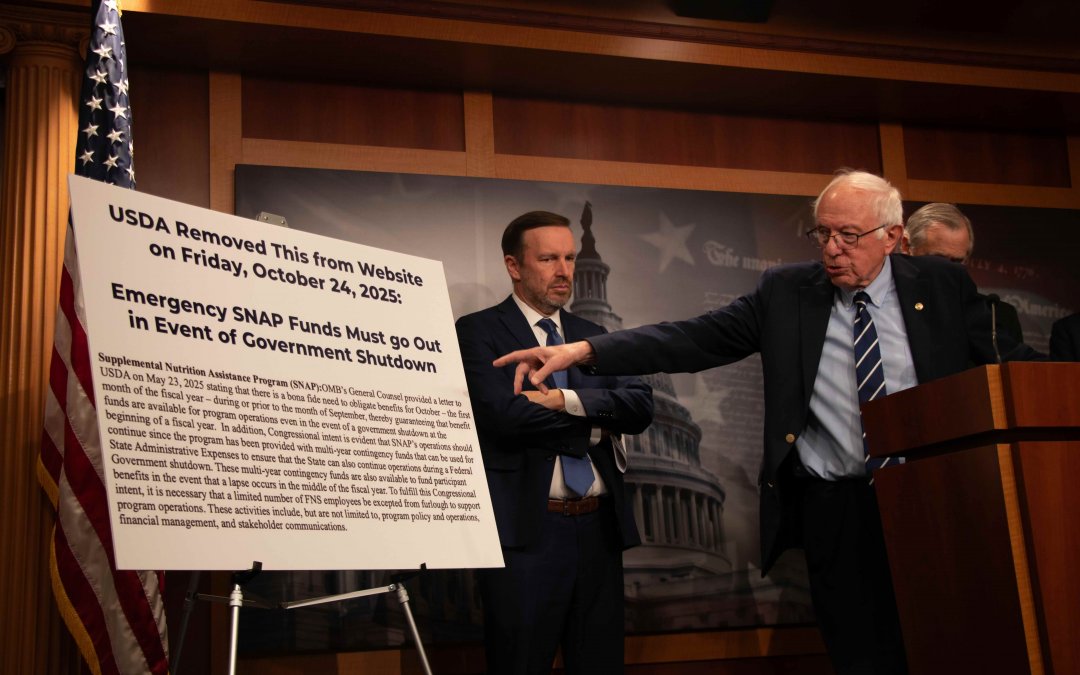WASHINGTON — In an attempt to curb a national humanitarian crisis when SNAP benefits — the Supplemental Nutrition Assistance Program that feeds nearly one in eight Americans — are set to be suspended nationwide on Nov. 1 due to the government shutdown, Democrats and Republicans are proposing separate bills to continue funding the program.
Sparring over who is to blame for the defunding, most Republicans maintain that Democrats must support Congress passing a clean bill to reopen the government. Meanwhile, Democrats have pushed back, insisting that the United States Department of Agriculture has already allocated contingency funds to support the benefits in the event of a shutdown.
“What brings us here today in an absolutely unbelievable way, President Trump is refusing to release the $5 billion in emergency funding for SNAP that helps feed 16 million kids, and that is a direct violation of the law,” Sen. Bernie Sanders (I-Vt.) said Wednesday afternoon.
The two parties have proposed two competing bills to continue SNAP benefits. On Tuesday, Sen. Ben Ray Luján (D-N.M.) introduced a bill that continues funding for SNAP and WIC, a nutrition program for Women, Infants and Children, supported by Democrats and by 11 Republicans. Sen. Josh Hawley (R-Mo.) put forward a similar bill on Oct. 21, co-sponsored by ten other Republicans and one Democratic senator, focused solely on SNAP funding.
Hawley’s effort was initially met with criticism by Senate Majority Leader Jon Thune (R-S.D.), with Republicans divided on the path forward.
“Even as nutrition programs are running out of money and federal workers are lining up with food banks, Democrats continue to reject every opportunity to end the shutdown or mitigate its pain,” Sen. Thune said.
Senate Minority Leader Chuck Schumer (D-N.Y.) responded by directly challenging Thune’s framing on the floor.
“The USDA said weeks ago that contingency funds were available to fund participant benefits,” Sen. Schumer said. “But now they’ve reversed course and literally wiped their plan from their own website. Because Donald Trump has ordered them not to use this funding.”
Over two dozen democratic attorneys general and governors are pursuing a lawsuit against the USDA for withholding these contingency funds. During the last government shutdown under the Trump Administration, SNAP benefits were maintained without pauses.
Experts say stress from uncertainty has already hit American households dependent on food assistance.
In the District of Columbia alone, 1 in 5 residents are on SNAP benefits. More than 54% of SNAP participants are in families with children and another 34% are in families with older adults or disabled members.
Kate Bauer, associate professor of nutritional sciences at the University of Michigan, works with families who rely on SNAP. She said misinformation around the program’s benefits fuels politicians to use public opinion to limit food assistance programs.
“There’s a belief that people on SNAP don’t work,” Bauer said. “There’s a belief that it goes to people who are here illegally. Those things are not true.”
SNAP lifted an average of 19,000 Washington D.C. residents above the poverty line annually between 2015 and 2019, including 8,000 children per year, according to the Center on Budget and Policy Priorities.
A mother on SNAP/EBT benefits from Washington, D.C., who did not want to be identified, said her future is ‘messed up’ while deliberations on continuing SNAP take place at the Capitol.
“I can’t feed my kids, and I can’t feed myself,” she said. “We’ve been heading up to Dollar Tree to get whatever we can get. It’s not fair.”

